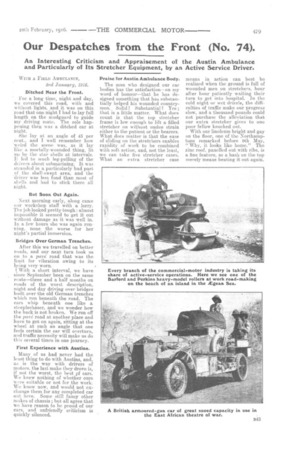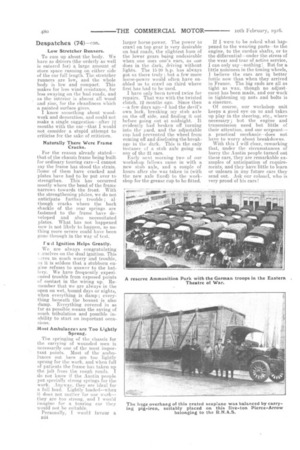Our Despatches from the Front (No. 74).
Page 13

Page 14

If you've noticed an error in this article please click here to report it so we can fix it.
An Interesting Criticism and Appraisement of the Austin Ambulance and Particularly of Its Stretcher Equipment, by an Active Service Driver.
TIATITE A FIELD AmBuLAwcF.,
3rd 'January, 1916.
Ditched Near the Front.
For a long time, night and day, we covered this road, with and without lights, and it was on this :road that one night I had to lay full length on the mudguard to guide my driving mate. The sole hapipening then was a ditched -car at night.
She lay at an angle of 45 per Cent., and I well remember how 'weird the scene was, as it lay like a mortally-wounded thing, lit up by the star shells at intervals. It led to much leg-pulling of the drivers about submarining. It, was stranded in a particularly bad part of the shell-swept area, and the 'driver was less fond than most of shells and had to stick there all night.
But Soon Out Again.
Next morning early, along came our workshop staff with a lorry. The job looked pretty tough : almost impossible it seemed to get it out without damage as it was well in. In a few hours she was again running, none the worse for her night's partial immersion.
Bridges Over German Trenches.
After this we travelled on better roads, and our next turn took us on to a pave road that was the limit for vibration owing to its being very worn.
11With a short interval, we have since September been on the same route—three and a half months on roads of the worst description, 'night and day driving over bridges built over the old German trenches which run beneath the road. The cars whip beneath one like a steeplechaser, and we wonder how the back is not broken. We run off the pave road at another place and have to get on again, sitting at the wheel at such an angle that one feels certain the ear will overturn, and traffic necessity will make us do this several times in one journey.
First Experience with Austin.
Many of us had never had the least thing to do with Austins, and, as is the way with drivers of motors, the last make. they drove is, if not the worst, the best pf cars. We knew nothing of whether ours were suitable or not for the work. We know now, and would not exchange them for any completed car out here. Some still fancy other makes of chassis ; but all agree that we have reason to be proud of our cars, and unfriendly criticism is quickly silenced. Praise for Austin Ambulance Body.
The man who designed our ear bodies has the satisfaction—on my word of honour—that he has designed something that has substantially helped his wounded -countrymen. Solid? Substantial ? Yes ; that is a little matter. What does count is that the top stretcher frame is low enough to lift a filled stretcher on without undue strain either to the patient or the bearers. What does matter is that the ease of sliding on the stretchers enables rapidity of -work to be combined with soft action, and, not the least, we can take five stretcher cases. What an extra stretcher case
means in action can best be realized when the ground is full of wounded men on stretchers, hour after hour patiently waiting their turn to get into hospital. In the cold night or wet drizzle, the difficulties of traffic make our progress slow, and a thousand pounds could not purchase the alleviation that our extra stretcher gives to ono poor fellow knocked out. With our linoleum bright and gay on the. floor, one of the Northamptons remarked before 9th May, "Why, it, looks like home." The zinc roof, panelled out with ribs, is a fine feature, as abash on the top merely means beating it out again. Low Stretcher Runners.
To sum up about the body. We have as drivers (the orderly as well is catered for) a large amount of store space running on either side of the car full length. The stretcher runners are low, and the whole body is low and compact. This makes for less wind resistance, for less swaying on the bad roads, and as the interior is almost all wood and zinc, for the cleanliness which a painted surface gives.
I know something about woodwork and decoration, and could not make a single suggestion— after 12 months with the car—that I would not consider a stupid attempt to criticise for the sake of criticism.
Naturally There Were Frame Cracks.
For the reason already stated— that of the chassis frame being built for ordinary touring ears—I cannot say. the frame has stood the strain. Borne of them have cracked and plates have had to be put over to strengthen. This has occurred mostly where the bend of the frame narrows towards the front. With the strengthening plates, we do not anticipate further trouble ; although cracks where the back shackle of the rear springs are fastened to the frame have developed and also necessitated plates. What has not happened now is not likely to happen, as nothing more severe could have been gone through in the way of test.
r u a Ignition Helps Greatly.
We are always congratulating c.trselves on the dual ignition. This ,.,ves us much worry and trouble, .as it is seldom that a stubborn engine refuses to answer to the battery. We have frequently experienced trouble from exposed points of contact in the wiring up. Remember that we are always in the open on wet, humid days or nights, when everything is damp ; everything beneath the bonnet is also damp. Everything covered in as far as possible means the saving of inneh tribulation and possible inability to start on important occasions.
Most Ambulances are Too Lightly Sprung.
The springing of the chassis for the carrying of wounded men is necessarily one of the most important points. Most of the ambulances out here are too lightly sprung for the work, and when full of patients the frame has taken up the jolt from the rough roads.
do not know if the Austin people put specially strong springs for the work. Anyway, they are ideal for a full load, Lightly loaded—when it does not matter for our work— they are too strong, and I would imagine for a touring car they would not he suitable.
Personally, I would favour a 1344
larger horse-power. The power to crawl on top gear is very desirable on bad roads, the slightest hum of the lower gears being undesirable when one uses one's ears, as one does in the dark, driving without lights. The 15-20 h.p. has always got us there truly; but a few more horse-power would often have enabled us to crawl on third where first has had to be used.
I have only been towed twice for repairs. That was with thetwisted clutch, 12 months ago. since then --a few days ago--I had the devil's own luck, breaking my stub axle on the off side, and finding it out before going out at midnight. It evidently had broken off turning into the yard, and the adjustable cup had prevented the wheel from coming off and disclosing the breakage in the dark. This'is the only instance of a stub axle going on any of the 21 cars.
Early next morning two of our workshop fellows came in with new stub axle, and a couple of hours after she was taken in (with the new axle fixed) to the workshop for the grease cup to be fitted. If I were to be asked what happened to the wearing parts--to the engine, to the eardan shafts, or to the differential--under the stress of the wear and tear of active service, I can only say—nothing! But for a little noisiness in the timing wheels, I believe the cars are in better fettle now than when they arrived in France. Thebig ends are all as tight as wax, though no adjustment has been made, and our work in tightening up nuts and bolts is a sinecure.
Of course, our workshop unit keeps a good eye on us and takes up play in the steering, etc., where necessary ; but the engine and transmission need but little of their attention, and our sergeant— a practical mechanic—does not have to worry about breakdowns.
With this I will close, remarking that, under the circumstances of hurry the Austin people turned out these cars, they are remarkable examples of anticipation of requirements, and they have little to learn or unlearn in any future cars they send out. Ask our colonel, who is very proud of his ears!




















